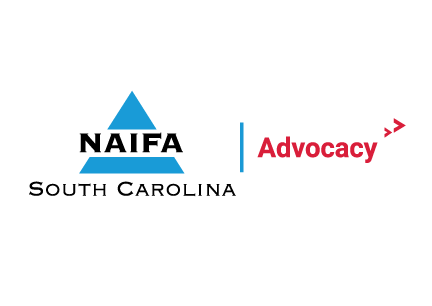

- SC Home
- About
- Chapters & Affiliates
- Advocacy
- Events
- Advisor Today
- Blog
- Contact




1. Legislative Action
Financial Exploitation – S. 425. This bill would address issues of financial exploitation of vulnerable adults. Under this bill, certain institutions and individuals such as wealth management institutions, financial services corporations, broker-dealers, financial planners, investment advisers, and investment adviser representatives, would be authorized to delay financial requests and transactions if there is reasonable suspicion of exploitation of a vulnerable adult and would be authorized to report the suspicion to the state. Any such institution or individual would be shielded from civil immunity if such a delay takes place. No civil or criminal immunity would be afforded to an institution, adviser or financial planner who participates or materially aids in the financial exploitation of a vulnerable adult.
The bill was amended on the Senate floor to clarify that the immunity is only to regard to potential liability for reporting and delaying a transaction. No civil or criminal immunity would be afforded to an institution, adviser or financial planner who participates or materially aids in the financial exploitation of a vulnerable adult.
This senate bill passed the House Labor, Commerce, and Insurance Committee and is currently on the House Calendar for consideration.
Financial Literacy - S.16. This bill proposes to improve financial literacy by replacing the economics coursework requirements currently being taught in high school with personal finance coursework.
South Carolina currently requires base level financial literacy instruction in high school that includes, but is not limited to, opening a deposit account, balancing a check book, completing loan applications, etc. These topics are typically covered in high school economics coursework Not only would Senate Bill 16 replace the high school economics curriculum with a dedicated finance course, the bill would require more expansive instruction in addition to the areas currently being taught in our state. These additional personal finance topics would include, among other topics, internet safety and cybersecurity; financial planning and asset management; and health, life, auto, and other insurance products.
This senate bill was considered by a House Education and Public Works subcommittee. There was lengthy discussion over the concerns of whether this bill is necessary. Some committee members believe the current base financial literacy is adequate and the estimate $4.3M costs of implementing the proposed changes in this bill. An amendment was adopted that would create a task force that would study the deficiencies in our current personal finance coursework and what topics should be added. This task force would complete its report before ant changes to the state's finance coursework are made. Senate Bill 16 received a favorable report as amended by the subcommittees.
2. Newly-Introduced Legislation
The following bills were introduced in the House and Senate and may be of interest to NAIFA-SC. You may view the bill by clicking on the hyperlinked bill number.
H.4220 – A BILL TO PROVIDE A CERTAIN PROCEDURE TO ALLOW FOR THE MUTUAL DECISION TO TERMINATAE OR RESCIND A LIFE INSURNACE POLICY.
H.4245 – A BILL TO REQUIRE ALL INDIVIDUAL AND GROUP HEALTH INSURANCE, HEALTH MAINTENANCE ORGANIZATIONS, AND THE STATE HEALTH PLAN TO CAP AN INSURED'S MONTHLY COST-SHARING OBLIGATION FOR COVERED PRESCRIPTION INSULIN DRUGS.
For any questions about this report, please contact James Knox at jknox@turnerpadget.com or 803-277-4320.
1. Legislative Action
Financial Exploitation – S. 425. This bill would address issues of financial exploitation of vulnerable adults. Under this bill, certain institutions and individuals such as wealth management institutions, financial services corporations, broker-dealers, financial planners, investment advisers, and investment adviser representatives, would be authorized to delay financial requests and transactions if there is reasonable suspicion of exploitation of a vulnerable adult and would be required to report the suspicion to the state. Any such institution or individual would be shielded from civil immunity if such a delay takes place.
The bill was amended on the Senate floor to clarify that the immunity is only to regard to potential liability for reporting and delaying a transaction. No civil or criminal immunity would be afforded to an institution, adviser or financial planner who participates or materially aids in the financial exploitation of a vulnerable adult.
The bill was given third reading in the Senate and was sent to the House for consideration.
2. Newly-Introduced Legislation
The following bills were introduced in the House and Senate and may be of interest to NAIFA-SC. You may view the bill by clicking on the hyperlinked bill number.
S. 718 – THIS BILL WOULD AMEND STATE LAW BY ADDING SECTION 38-61-80 SO AS TO ESTABLISH THAT A DIRECT PRIMARY CARE AGREEMENT IS NOT A CONTRACT OF INSURANCE AND NOT SUBJECT TO REGULATION BY THE DEPARTMENT OF INSURANCE, AND TO DEFINE THE TERM DIRECT PRIMARY CARE AGREEMENT.
S. 744 – THIS BILL WOULD AMEND STATE LAW TO PROVIDE FOR MUTUAL RESCISSION OF INDIVIDUAL LIFE INSURANCE POLICIES AND TO ALLOW FOR THE MUTUAL DECISION TO TERMINATE OR RESCIND A POLICY OF INSURANCE.
For any questions about this report, please contact James Knox at jknox@turnerpadget.com or 803-277-4320.
Thank you Sponsor !


Copyright © 2020 NAIFA-South Carolina
600 State Street, Suite A
Cedar Falls, IA 50613
Phone: 803-764-5147
Fax: 703-770-8224
info@naifasc.org